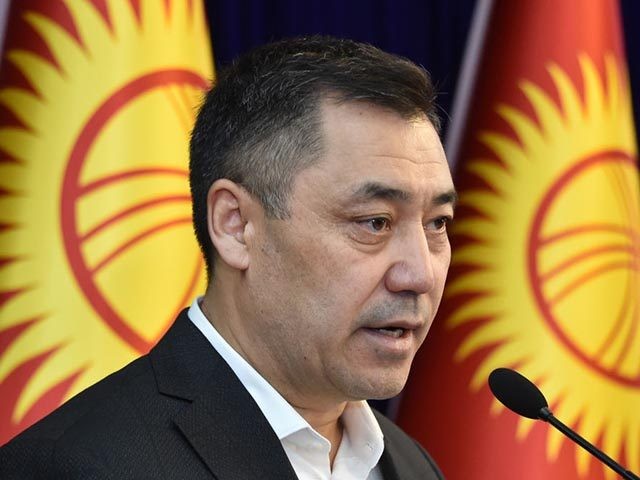Lawmakers in Kyrgyzstan on Sunday questioned the controversial appointment of Sadyr Japarov, a convicted kidnapper, as the country’s new prime minister on October 10, days after he was sprung from prison by protesters amid ongoing unrest over a disputed parliamentary election on October 4.
Kyrgyzstan’s divided parliament gathered on Saturday for an unusual session at Kyrgyzstan President Sooronbai Jeenbekov’s official residence outside of the capital, Bishkek. The lawmakers were forced to convene there after protesters took over and ransacked the official parliament building during chaotic unrest on October 6.
Although just 50 members of the 120-seat parliament were present at the October 10 session, the deputy speaker of parliament claimed to have reached a quorum of 61 deputies after allegedly obtaining “power-of-attorney documents from absent lawmakers,” Radio Free Europe/Radio Liberty’s (RFE/RL) Kyrgyz Service reported.
Parliament Deputy Aida Kasymalieva told RFE/RL on Sunday that she left the session on October 10 “to prevent a quorum and forestall a vote on Japarov’s candidacy,” but that her vote had still been cast illegally.
“We are preparing documents now to appeal to the courts,” she told the U.S. government-funded broadcaster.
Kasymalieva added that she had requested a list of lawmakers who voted for Japarov’s appointment from parliament staff, but had yet to receive a response.
The legislator later wrote in a Facebook post that she considered all decisions reached during the extraordinary session of parliament to be “illegal.”
Former Kyrgyzstan Prime Minister Feliks Kulov agreed with Kasymalieva on Sunday, pointing out that the country’s “constitution requires the physical presence of a majority of deputies in order to form a quorum,” according to RFE/RL.
Saturday’s controversial vote approving Japarov as Kyrgyzstan’s new prime minister followed one day after Kyrgyzstan President Jeenbekov declared a state of emergency in the capital. As part of the order, Jeenbekov deployed troops to the streets of Bishkek to respond to ongoing turmoil and violence after over a week of political upheaval.
Kyrgyzstan has been gripped by uncertainty since parliamentary elections on October 4 were marred by allegations of fraud, including alleged vote-buying to benefit status quo political parties. The allegedly fraudulent elections sparked street protests in Bishkek on the morning of October 5 that grew violent later that night. Protesters stormed government buildings during the ensuing chaos, including the parliament building and the main government building, known as the White House, which “briefly caught fire” during its takeover.
“Members of more than 10 political parties, which failed to secure seats in the legislature, took part in the rally,” which was attended by 5,000 to 6,000 people, according to Russian state news agency TASS. The protesters demanded that Kyrgyzstan’s Central Elections Commission cancel the October 4 election results, which it later did. Since then, various political factions in Kyrgyzstan have vied for control of the country.
Friday’s state of emergency order “began shortly after clashes on October 9 between Japarov supporters and backers of rival parties supporting former President Almazbek Atambaev and another prime minister candidate, Omurbek Babanov,” RFE/RL noted.
A former member of Kyrgyzstan’s parliament, Japarov is described by RFE/RL as a “nationalist” and “populist” politician. His supporters sprang him from prison during the post-election turmoil on October 6, where he was serving an 11.5-year sentence after being convicted in 2017 of kidnapping a regional governor.
“A court struck down the verdict this week during the unrest,” according to the report. Kyrgyz news outlets note explicitly, however, that the nation’s top court has not dismissed his sentence.
Japarov also served as an adviser to former Kyrgyzstan President Kurmanbek Bakiev, who was overthrown during previous political upheavals in 2010; he has described the kidnapping charges against him as politically motivated.
Kyrgyzstan’s previous prime minister, Kubatbek Boronov, was forced to resign on October 6 amid the turmoil, which has since spread nationwide.
Japarov said on Saturday that as Kyrgyzstan’s new prime minister he “would retain all government ministers who were still serving in an acting capacity” following Boronov’s ouster.
He also “announced a 10-point program aimed at restoring stability, including protecting investors, ensuring food security, and ‘bringing to justice all officials involved in corruption’,” according to RFE/RL.
Japarov added that he expects current president Jeenbekov to honor a pledge he made last week to resign once a new government has been formed.
“I met with [President] Sooronbai [Jeenbekov],” Japarov told the parliament session on October 10.
“He said he would resign and leave. If you [lawmakers] approve the government’s program and makeup, then he said he would submit his [resignation] letter and leave,” Japarov said.
Should Jeenbekov step down, it would mark “the third time in 15 years that public protests have brought down a Kyrgyz president,” according to the report.
Kyrgyzstan, which borders China, is considered Central Asia’s only country with elements of democracy. Despite this, endemic clan rivalries between its northern and southern regions have threatened the nation’s stability over the past several years. Kyrgyzstan also struggles with severe poverty as one of the poorest of the former Soviet republics.

COMMENTS
Please let us know if you're having issues with commenting.